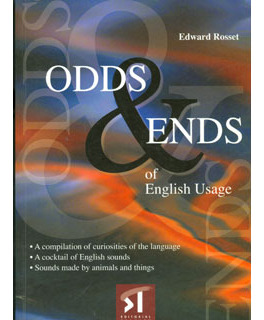Odds Ends Of English Usage
Paga en cuotas
¡Última disponible!

+5mil ventas
Información de la tienda

Tienda oficial de Mercado Libre
MercadoLíder Platinum
¡Es uno de los mejores del sitio!


Descripción
NOMBRE COMPLETO
Odds ends of english usage
_____________________________________________________
INFORMACIÓN ADICIONAL
- Estado: Nuevo
- Distribuidor: Promolibro
- Editorial: Apóstrofe
- ISBN: 9788478733736
- Autor: Edward R. Rosset
- Año de edición: 2004
- Formato: Libro Impreso
- Idioma: Español
- Páginas: 72
- Peso: 170 gr
- Tamaño: 16.4 x 23
_____________________________________________________
DESCRIPCIÓN:
On one point students of English all agree: English pronunciation and usage are complicated, irregular and frequently confusing. This book, an exhaustive compilation of linguistic curiosities, list: Words that rhyme although their spelling is quite different (e.g. ache/lake, blood/mud, ferry/bury), words of similar derivation but with different meanings (e.g. official/officer, effective/efficient), homophones, i.e. words of similar pronunciation but of different meaning (e.g. affect/effect), homographs, i.e. words which are written the same way but which have different pronunciation and meanings (e.g. bow, the front part of a ship, and bow, to bend over), homonyms, i.e. words whose spelling and pronunciation are identical but whose meanings differ /e.g. bark, the noise made by a dog, and bark, the shell of a tree), useful collective nouns (e.g. a herd of cattle, a horde of savages, a pack of wolves), plurals of compound nouns (e.g. father-in-law/fathers-in-law, manservant/menservants), common jobs, Use of on, in and at and other troublesome prepositions, rules for the pronunciation of regulars verbs (when-ed may be pronounced as-d, -ed or-t), examples distinguishing between the use of make an do, verbs that double the final consonant in the past and present participles, indispensable everyday idioms.
Preguntas y respuestas
¿Qué quieres saber?
Pregúntale a Libreria de la U
Nadie ha hecho preguntas todavía. ¡Haz la primera!


